Archive for ‘Psychological’ Category
52 Ways to Say NO to a Request So You Can Say YES to Your Priorities
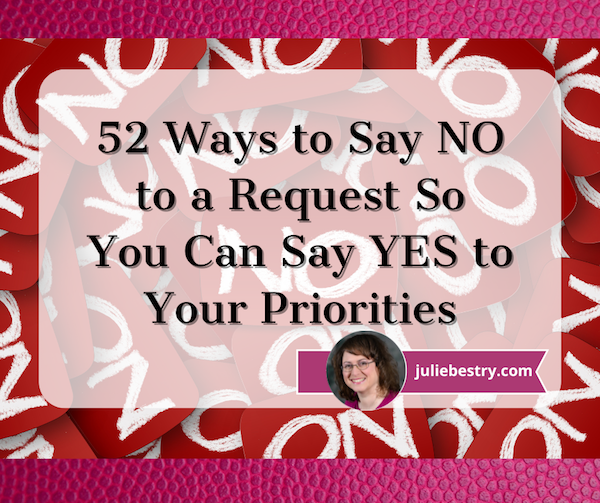 Do you ever find yourself avoiding contact with other people out of sheer self-preservation and fear that they’ll ask you to add one more unfulfilling task or obligation?
Recently, I read Ali Abdaal’s Feel Good Productivity: How To Do More of What Matters To You. The book serves as a sort of primer on the various macro and micro productivity concepts and strategies that we discuss at the Paper Doll blog. The book accents engaging in tasks that will increase your energy rather than drain it.
Do you ever find yourself avoiding contact with other people out of sheer self-preservation and fear that they’ll ask you to add one more unfulfilling task or obligation?
Recently, I read Ali Abdaal’s Feel Good Productivity: How To Do More of What Matters To You. The book serves as a sort of primer on the various macro and micro productivity concepts and strategies that we discuss at the Paper Doll blog. The book accents engaging in tasks that will increase your energy rather than drain it.
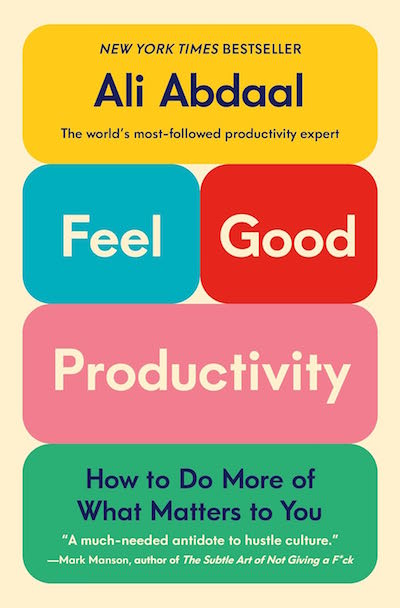 Abdaal’s idea of an “energy investment portfolio” particularly caught my attention. At its most basic, the energy investment portfolio is a deeply prioritized and categorized plan of attack, such as we reviewed when talking about the Eisenhower Matrix in posts like Use the Rule of 3 to Improve Your Productivity and Frogs, Tomatoes, and Bees: Time Techniques to Get Things Done.
Part of this approach is based in clarifying which of the things on your list are your someday “dream” investments (your big, ambitious projects for which you likely have little time right now) and your “active investments” (projects and tasks which you are or should be giving your greatest attention right now).
The key to Abdaal’s energy investment portfolio, an homage to a financial investment portfolio, is limiting the number of projects on your list of “active investments.” There’s only so much you can do right now, and those things better energize you if you don’t want to hide from them.
To explore this concept more before dipping into the book, check out Abdaal’s The Energy Investment Portfolio article and the video below:
This popped to the forefront of my mind as I started reading Cal Newport’s newest book, Slow Productivity: The Lost Art of Accomplishment Without Burnout. (Slow productivity, like the slow food, slow media, and slow travel movements, is about improving life by cutting back on speed and excess, and instead focusing on intentionality and quality.)
Newton caught my eye with an extended discussion of my beloved Jane Austen. Most biographies always paint her as successful because she would sneak in writing efforts in the precious few quiet moments she had to herself. Newport notes that her nephew James Austen’s descriptions of Austen’s writing style seem “to endorse a model of production in which better results require you to squeeze ever more work into your schedule” and calls this a myth.
Indeed, modern biographers have found the reverse, that Austen “was not an exemplar of grind-it-out busyness, but instead a powerful case study of something quite different: a slower approach to productivity.”
As true Austen aficionados know, once Austen (as well as her sister and elderly mother) moved from Southhampton to quiet Chawton cottage, she was able to escape most societal obligations and focus on writing. Quoting from Newton:
Abdaal’s idea of an “energy investment portfolio” particularly caught my attention. At its most basic, the energy investment portfolio is a deeply prioritized and categorized plan of attack, such as we reviewed when talking about the Eisenhower Matrix in posts like Use the Rule of 3 to Improve Your Productivity and Frogs, Tomatoes, and Bees: Time Techniques to Get Things Done.
Part of this approach is based in clarifying which of the things on your list are your someday “dream” investments (your big, ambitious projects for which you likely have little time right now) and your “active investments” (projects and tasks which you are or should be giving your greatest attention right now).
The key to Abdaal’s energy investment portfolio, an homage to a financial investment portfolio, is limiting the number of projects on your list of “active investments.” There’s only so much you can do right now, and those things better energize you if you don’t want to hide from them.
To explore this concept more before dipping into the book, check out Abdaal’s The Energy Investment Portfolio article and the video below:
This popped to the forefront of my mind as I started reading Cal Newport’s newest book, Slow Productivity: The Lost Art of Accomplishment Without Burnout. (Slow productivity, like the slow food, slow media, and slow travel movements, is about improving life by cutting back on speed and excess, and instead focusing on intentionality and quality.)
Newton caught my eye with an extended discussion of my beloved Jane Austen. Most biographies always paint her as successful because she would sneak in writing efforts in the precious few quiet moments she had to herself. Newport notes that her nephew James Austen’s descriptions of Austen’s writing style seem “to endorse a model of production in which better results require you to squeeze ever more work into your schedule” and calls this a myth.
Indeed, modern biographers have found the reverse, that Austen “was not an exemplar of grind-it-out busyness, but instead a powerful case study of something quite different: a slower approach to productivity.”
As true Austen aficionados know, once Austen (as well as her sister and elderly mother) moved from Southhampton to quiet Chawton cottage, she was able to escape most societal obligations and focus on writing. Quoting from Newton:
This lesson, that doing less can enable better results, defies our contemporary bias toward activity, based on the belief that doing more keeps our options open and generates more opportunities for reward. But recall that busy Jane Austen was neither happy nor producing memorable work, while unburdened Jane Austen, writing contentedly at Chawton cottage, transformed English literature.
Dubious? Look at the entries on this Jane Austen timeline, starting from 1806 onward! And let’s face it, without Austen, there would be no inspired homages, like Bridgerton, and for any of you who just spent the weekend transfixed by the first half of season three, that’s a fate not worth contemplating. I’m sure I’ll have more to share about this book as I get further on, but I was captivated by the chapter on Newport’s first principle of slow productivity, based on this finding. Principle #1 is simply Do Fewer Things.Strive to reduce your obligations to the point where you can easily imagine accomplishing them with time to spare. Leverage this reduced load to more fully embrace and advance the small number of projects that matter most.
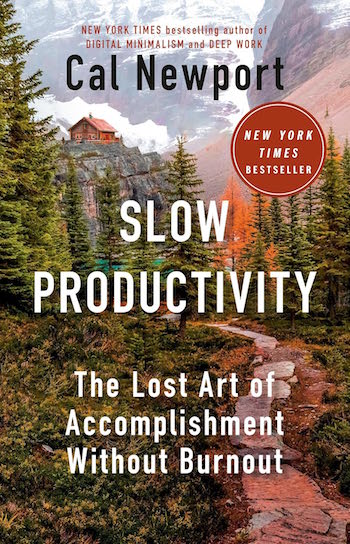
YOU ARE ALLOWED TO SAY NO
From Abdaal and Newton to past Paper Doll posts, we know we have to focus our attention on fewer but more rewarding things. We must learn to emphatically say NO. Yes, you have to pay your taxes (or be prepared to suffer the consequences). You have to obey traffic laws. (Ditto). You have to feed your children (or at least arrange for them to be nourished). But you do not have to be in charge of cleaning out your company’s break room fridge. You do not have to buy your spouse’s birthday gift for your mother-in-law. (That’s your spouse’s job.) You do not have to join a book club or serve on your homeowner association’s planning committee or go to dinner with someone you really don’t want to date! There are various situations when we should be saying no to taking on new obligations.- You have more on your plate than you can handle comfortably (or safely for your mental or physical health).
- Your energy level is depleted (or you believe it would be depleted) by anything being added to your obligations.
- The new task doesn’t fit your skill set or interests.
- The task is unappealing because of the situation (the location, other people involved, the monetary cost)
- You just don’t wanna.
THE POWER OF SAYING NO
Organizing is as much about saying no as saying yes. Thus, I help clients determine what tangible possessions belong in their spaces and their lives, and which don’t. Some acquisitions were wisely planned purchases; others were picked up on impulse. Some are gifts given out of love, while others were given out of a sense of obligation. Still other things were abandoned on our metaphorical doorsteps (or, in the case of grown children who have flown the nest, things were abandoned in our basements, attics, closets, cupboards and corners). Just as clients must discern the difference tangible items that make their lives more appealing, robust, and fulfilled vs. those that crowd them out of their spaces, they must also evaluate how acquired activities can clutter their hours and days and diminish enjoyment of other experiences. Some activities, we choose with enthusiasm; others have been pressed upon us. Perhaps your early May serf imagines that the late September version of you will be delighted to give a speech or take on another committee role. Frustratingly, we always imagine that Future Us will be less busy. And we have all occasionally been guilted or cajoled into obligatory participation. Some tasks or roles have acceptable tradeoffs. I know that Paper Mommy didn’t enjoy the blessings of being a “room mother” year-after-year, going on field trips to the nature preserve or the science museum and having to help corral other people’s unruly offspring. But (luckily) she enjoyed hanging out with tiny Paper Doll, and the experience gave her opportunities to tell hysterical anecdotes to her friends. You may not necessarily want to serve on the awards committee, coach your child’s soccer team, or help interview new applicants at work, but the benefits sometimes outweigh the costs. The key, however, is to protect yourself from requests for your time and labor that drain your energy and cause resentment by taking time away from your larger priorities. If you don’t have the power to say no, freely, then you don’t really have the power to say yes. Whether stuff or tasks, things should enter your life with your consent. But if you’re unused to declining, it will require effort to exercise new mental muscles. The rest of this post offers strategies to help you avoid being saddled with the clutter of new obligations and eliminate tasks that no longer fit your life, or at least the life you want to lead.GET RID OF THE GUILT
There are many reasons why people fear saying no, but they almost always come down to fearing others’ reactions. Sometimes, this has to do with social roles and the belief that our life’s role is to do for others. But remember my Flight Attendant Rule: You must put the oxygen mask over your own nose and mouth before attending to those traveling with you. Overloading yourself makes it impossible to be there for others, whether at your job, in your family, or among your friends or in your community. (And think back to what Abdaal said about investing your energy.) Guilt also comes from the fear that saying “No” will make you sound mean or unduly negative. The examples below will help you craft responses that are firm in guarding your boundaries but upbeat and positive in attitude so as to cushion your response in a way that feels more like kindness than rejection. And in each case, the response means “No” without ever verbalizing the word.FIRST, TAKE A PAUSE
Being polite is a given; being kind is a virtue. Imagine you’re having a rough day. You’re rushing to get to a client meeting but your tiny human is just not interested in putting on her shoes so you can get everyone into the car. Traffic is bad, and just as you get everyone unloaded, a PTA parent corners you with an “assignment.” It would be instinctual to lash out and say, “Can’t you see I’m drowning? Can’t you see my nice suit for a presentation has dried cream of wheat on it because the tiny humans decided to have a food fight? What in the blankety-blank-blank makes you think I give a good bleep-bleep about organizing school spirit day?! I have no spirit, why should I care if everyone shows up wearing the same colors and why should I be the one to tell them to do it? Is your life so ridiculously so small and pitiful that school colors matter at all?!” Instinctual, but halfway through that tirade, you’d notice parents making their own tiny humans back away from you, and furtively glancing at one another, and possibly at the school security guard. Your youngest is two, but you can now imagine parents giving you (and your kids) wide berth until all your offspring have graduated. (The one upside is that nobody will ever ask you to volunteer again!) Instinct can make you blow up; taking a moment to pause and having a plan in place to say no without feeling like you’ve become a wild banshee may preserve your reputation (allow your kids to be able to invite friends over…someday).NEXT, SHOW GRATITUDE
Start by thanking the person making the request. Thank them? I can hear you screaming from here. Yes, get in the habit of thanking people for asking for your help, whether you’re being asked to do something prestigious like speak at a conference or something that’s basically scut work. There are so many people, particularly those who are elderly or in the disability community, whose potential value is ignored by society, so take a moment to appreciate being considered at all. Don’t thank them just because it’s polite; thank them because it gives you a moment to feel valued and appreciated, and because it forces you to pause and gather your resolve. Begin with something like:- I appreciate you thinking of me for this.
- Thank you for making me feel valued in our community (or workplace)
- Thank you for considering me for this role, but I have to decline [for reasons].
- I’m honored that you thought of me for this, but I have to pass [this time].
PICK AN APPROACH
Not every request requires the same style of response.Assertive Stance
When dealing with an equal, whether professionally or socially, address the person in a straightforward manner, making clear that the rejection is not about them (or their pet project) but about you. This way, you avoid them giving all sorts of reasons why they’ll be able to wave their magic wants and eliminate the aspect of the project you see is problematic. But focus on yourself, and there’s little most people can say. (Obviously, if you encounter someone who thinks you should give up caring for your ill grandmother so you can do bus duty at the child’s school, you have my permission to fake-call your grandmother in front of this person to make them uncomfortable. Really go for it. “I know you need me to change your catheter/clear your feeding tube/relieve you of your unremitting loneliness since Grandpa died, but Betty here says she doesn’t feel you’re as important as bus duty.”) State your situation without getting into the weeds. Focus firmly on setting and maintaining your boundaries, and use “I” statements to keep the rejection focused on what you can control.- Unfortunately, I have to decline this opportunity. My plate is already full.
- I’m sorry, but I can’t take on any more projects at the moment.
- I need to focus on my existing priorities right now.

Photo by RepentAndSeekChristJesus on Unsplash
- I’ve promised my children/spouse that I won’t take on any more activities that keep me away from the family. I’m sure you understand.
- I need to decline this to maintain my work-life balance.
- I’m prioritizing my health and well-being right now, so I can’t commit to anything extra.
- I’ve learned to recognize my limits, and I can’t stretch myself any thinner.
- I’m trying to prioritize my well-being, and taking on more isn’t conducive to that.
- I’ve realized I need to make more time for myself, so I have to decline.
- Again, I’ll have to decline. It’s just not feasible for me right now.
- As I said, I appreciate the offer, but I have to say no.
- That won’t be possible.
Gentle Stance
Sometimes, you don’t feel that your professional or social relationship with the requesting individual is equal. For whatever, you may feel that you have to be more diplomatic or offer explanations that the other person will feel is more valid. There are a few ways to approach this. The best way to approach this is to express enthusiasm for the offer and/or the project or regret that you can’t participate, or a combination, before identifying intractable obstacles. However, be cautious in how effusive you are about your enthusiasm and/or regret so as not to overplay your hand.- This sounds fascinating. I wish I could say yes, but I have to decline because [reasons]
- I’m sorry, but I won’t be able to participate because [commitments/reasons]
- I’d love to help, but I’m already committed [to several specific prior obligations]
Delaying Approach
Instead of an outright no, it may be useful to suggest the possibility of a postponement of your involvement. However, I caution you to only use this method if it’s realistic. It’s not fair to get someone’s hopes up that they will be able to count on you in the future, so only use this method if you believe it’s likely you will be able to help at some later point (or you believe there’s no likelihood you’ll be put in this situation again). It might sound like:- Ouch, there’s so much on my plate right now, so I’m not able take this on at the moment. Can we revisit this in [specific timeframe, like next semester or 3rd Quarter]?
- I can’t commit right now, but let’s touch base after the holidays and see if my availability has changed.
- I’ve decided to focus more on my career right now. Maybe next season.
Helpful Approach
Sometimes, your “no” reflects your specific circumstances, but you do value the project, organization, or effort. If so, expand upon the ways of declining above, but add helpful suggestions or offers, like:- That won’t be possible, but I’m able to send you some bullet points on how I accomplished goals during the eleven (freakin’) years I served as committee chair!
- I’m not able to take on this role, but I’d be happy to donate [X dollars, or my backyard, or my unused bongo set].
- I’m really not qualified, but let me tell you who would be perfect for this.
- So, yeah, based on everything I just said, I can’t do this, but TJ just rolled off the nominating committee and might be looking for some new role.
- I’m not the right person for this, but this is right up Diane’s alley. She’s got an accounting background and is already at the school on Tuesday nights while her daughter is at drama club.
Sometimes, the helpful approach isn’t for the other person, but for you. There will be times, usually in the workplace, where you will be asked to do something where, though the task is couched as a request, it’s really an order. You won’t be able to say no (and indeed, we would need another whole post, or possibly a book, to cover handling this). If you’re asked to tackle something where you lack the skill set, the desire, and the time to handle this new project and everything else on your plate, don’t panic. Thank the person for their confidence in you (again, always start from a position of gratitude unless you’re actually ready to quit the job), reiterate all of your (work) obligations and ask for guidance in prioritizing.
Two more options you might want to use, in combination with other responses, are flattery and humor.
Flattery
Sometimes, you can inveigle the other person into deciding they deserve better than what you are (un)willing to give:- Thank you for thinking of me, but I have too many obligations right now. I wouldn’t want to risk not giving this important project the attention it deserves.
- Thanks, but I would rather decline now than risk doing a mediocre or rushed job. Your [project/committee/idea] deserves someone’s best effort.
Humor
In J.D. McClatchy’s Sweet Theft: A Poet’s Commonplace Book, writer and translator Estelle Gilson shares a translation of a rejection issued by a Chinese economic journal to someone who had submitted a paper.“We have read your manuscript with boundless delight. If we were to publish your paper, it would be impossible for us to publish any work of lower standard. And as it is unthinkable that in the next thousand years we shall see its equal, we are, to our regret, compelled to return your divine composition and to beg you a thousand times to overlook our short sight and timidity.”
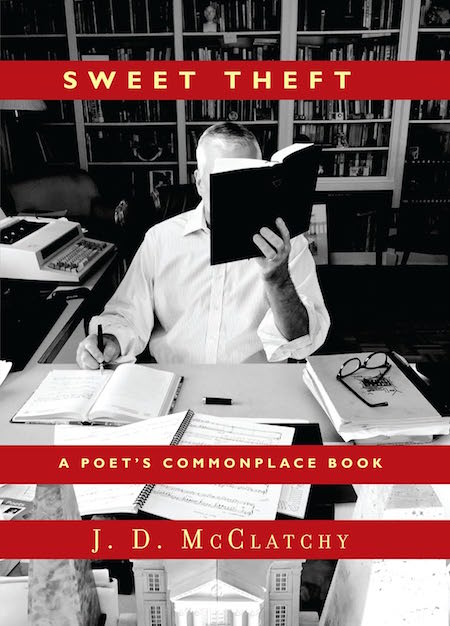 The first time I read it, I laughed at the audacity of the hyperbole (even as I accounted for the cultural expectations likely inherent in the message). However, upon rereading, I recognized that while the Chinese recipient may (or may not) have found the rejection funny enough to be uplifting, humor may help you powerfully judge the “no” to a softer landing.
Lightening the mood makes it easier to state the refusal. You’ll feel more like you’re performing a “bit” and it’s just a touch distracting for the person on the receiving end. You don’t have to actually be funny ha-ha, but goofiness, snark, or hyperbole can dissipate the tension (or give you time to think of an exit line).
The first time I read it, I laughed at the audacity of the hyperbole (even as I accounted for the cultural expectations likely inherent in the message). However, upon rereading, I recognized that while the Chinese recipient may (or may not) have found the rejection funny enough to be uplifting, humor may help you powerfully judge the “no” to a softer landing.
Lightening the mood makes it easier to state the refusal. You’ll feel more like you’re performing a “bit” and it’s just a touch distracting for the person on the receiving end. You don’t have to actually be funny ha-ha, but goofiness, snark, or hyperbole can dissipate the tension (or give you time to think of an exit line).
- I tried cloning myself, but it did NOT go well. The FBI made me destroy my machine.
- If I agree to this, my cat might stage a protest. Can’t risk a kitty rebellion.
- I’d love to help, but my superhero cape is at the dry cleaners.
Remember, you are not asking for permission to say no. You are engaging in polite (and hopefully kind) communication in navigating the tricky negotiations of social and professional diplomacy. Saying “no” to adding an unfulfilling obligation to your schedule lets you say “hell, yes!” to your priorities, your loved ones, your self-care, and your dreams. Saying 'no' to adding an unfulfilling obligation to your schedule lets you say 'hell, yes!' to your priorities, your loved ones, your self-care, and your dreams. Share on X
Paper Doll Explains Aspirational vs. Inspirational Clutter
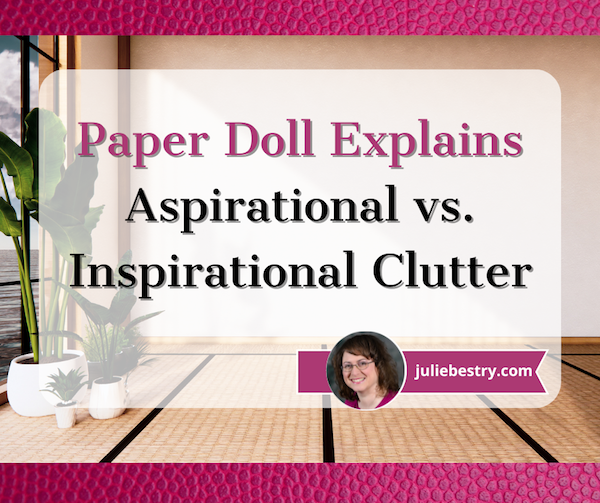
Do you ever think about all the different flavors of clutter?
A few years ago, I wrote The Boo-Hoo Box: Organizing Painful Clutter.
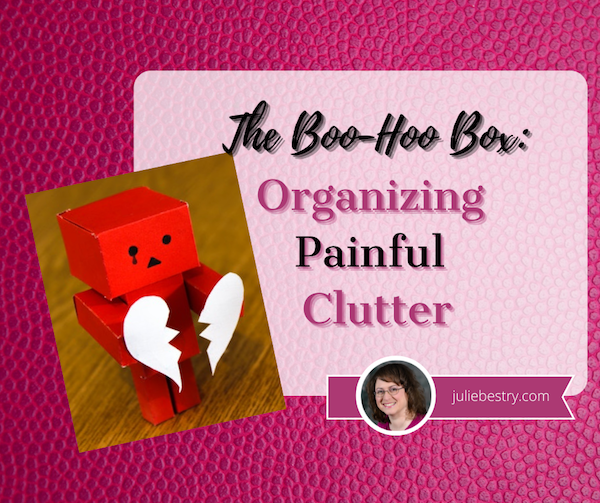
In that post, as a precursor to discussing the kinds of heartbreaking clutter people keep, I introduced some of the major categories of clutter, and this is worthy of a review as we explore today’s topic.
CATEGORIES OF CLUTTER
When working with my organizing clients, we tend to identify six different kinds of clutter (though these are only the main ones — there are others).
- Practical clutter — These are things that are useful, in and of themselves, like clothing, bedding, or kitchen implements. It’s not that we don’t need these things, but we generally don’t need so many (black skirts, frying pans) and we need to let go when specific items no longer suit our needs.
- Informational clutter — We keep documents and clippings, whether on paper or digitally, because we believe the information is valuable. The problem is that we rarely go back to consider how valuable something is now vs. when we acquired it, and we tend not to think about whether it might be better to eliminate (outdated) information, digitize it, or access the information anew via the internet to reduce the bulk.
- Identity clutter — Sometimes, the clutter we keep is an excess of items that we feel help define us. Our clutter may not be useful (in a practical sense) but we perceive it as useful for defining who we are or who we wish to be seen as. Our clutter might say, “I’m the kind of person who runs marathons [or wins spelling bees or bakes from scratch].”
- Aspirational clutter — This type of clutter accounts for all of the items in your space which support hobbies you tell yourself that you are going to take up, but never really do. Whether you are saving a closet full of fancy papers and Cricut gadgets for the day when you finally decide to become a scrapbooker or amass shelves of books on the topic of “How To [train championship Greyhounds, write a novel, become a successful crypotocurrency miner],” there comes a point when you’ve got to recognize that you have an excess of items supporting a life you don’t really lead.
- Nostalgic clutter — Nostalgia is defined as “a sentimental longing or wistful affection for the past, typically for a period or place with happy personal associations.” Obviously, life is made better by the things that truly remind us of happy (or happier) times, but an excess of nostalgic emblems of our past can fill up our homes in the present and prevent us from having space in our lives to make a future. Sometimes, we just have to take photos of those ancient macaroni art projects and discard the originals, letting them crumble in peace.
An excess of nostalgic emblems of our past can fill up our homes in the present and prevent us from having space in our lives to make a future. Share on X - Painful or sad clutter — This category encompasses things that remind us of bad times or bad people.

Break-Up Photo by Kelly Sikkema on Unsplash
Clients tend to have a good handle on both practical and informational clutter. Someone might save useful things that they used in the past (or acquire in the present) because they might be useful now or in the future; the same is true of clippings or online information in case they might be desired later.
Identity clutter, nostalgic clutter, and painful clutter is almost always about the past. But as we’ll see, aspirational clutter is about the future.
WHAT KIND OF CLUTTER IS IT REALLY?
Too often, we think of clutter as if it were a monolith. Yes, a house full of clutter is daunting, but identifying what kind of clutter something is helps us determine why we’re holding onto it so we can (eventually) confidently let it go.
I do prospective client consultations by phone; this gives me a chance to get to know what a client may need and helps them determine whether they like my philosophy and can bear my goofy sense of humor. Early on, I ask them to describe what kinds of clutter they have.
I’m not looking for a hierarchy or categorization, just a sense of what “stuff” is bothering them. Usually, I hear something like: too many clothes that don’t fit (or don’t fit in the closet); outgrown children’s toys; an overwhelm of papers, books, and digital media. This gives me an idea of the tangible items needing attention. However, once in people’s homes, I’m able to see that clutter is not so simple.
For example, a closet filled with maternity clothes may reflect that that a client has spent a number of years bearing and raising kids. If she’s in her 30s, this may just be practical clutter. She’s been pregnant one or more times, acquired clothing through shopping and gifts, and hasn’t yet winnowed the collection down. However, if the woman is older, perhaps in her 50s or 60s (and her own children are already having babies), she may be holding onto the clothing out of a strong sense of nostalgia, remembering fondly when her family was small (but growing) and possibilities were endless.
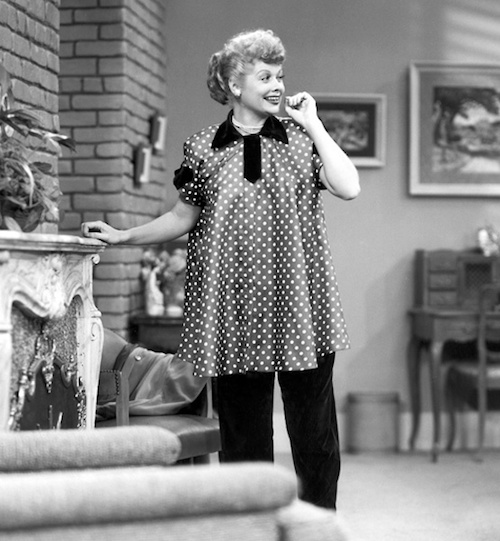
It’s even possible that now that her children are adults, she may feel adrift and unneeded. At this point, all of the maternity clothes can be identity clutter, items that people hold onto out of fear of becoming unmoored from their identities. If the woman’s sense of self is closely tied to being a mom, the idea of letting go of those clothes may feel very much like letting go of one’s sense of self. Until a client is prompted to discuss the possessions in question, the category of clutter may not yet be clear.
I recently spoke with an older couple who were hoping to downsize in advance of an eventual move to senior living. When I asked them to describe how they felt about downsizing, the husband recounted that every time he thought about letting go of materials related to his career and hobbies, it made him feel like they (and now he) lacked worth.
Ouch. That showed incredible self-awareness on his part, as well as a pain point. I gently asked him to consider that his identity exists in his memory and in the memories of all who worked with him and knew him.
His adult daughter, also on the call, riffed on some things we’d discussed earlier about donating items, and reminded him that these could be a living legacy if donated to an organization related to his former profession; his materials could find a new life with someone who needs them rather than just rusting away in a storage unit, unused and unnoticed. His identity could actually get refreshed through possessions finding a new life as something other than clutter.
Proud possessions from the past can become clutter in the present and the future, but self-awareness and analysis can open our eyes to options and opportunities.
ASPIRATIONAL CLUTTER VS. INSPIRATIONAL CLUTTER
This brings us to considering things we have acquired (and continue to acquire) for the future.
After a client and I discussed painful clutter and how the Boo-Hoo Box can counter emotional pain, she mentioned that she had a lot of items she’d purchased to inspire her to overcome emotional distress. She said that what I called aspirational, she considered inspirational. It’s a great point, and I think it might be helpful to look at how aspirational and inspirational clutter can be similar and how they are different.
Aspirational Clutter
The way I look at it, aspirational clutter is made up of items that support hobbies or activities you tell yourself that you are going to take up, but never really do. They’re gathering dust. It’s clutter because they can be used, but you aren’t using them. Examples include:
- Crafting and art supplies — Over the years, I’ve visited a lot of clients homes where cabinets and even rooms are overflowing with yarn and needlework supplies, boxed up sewing machines, canvases, paints and brushes, and packaged art projects. They’re bought with the aspiration of tapping into creativity and expressing artistic talents. But so many people accumulate art supplies without actually dedicating time to create art.
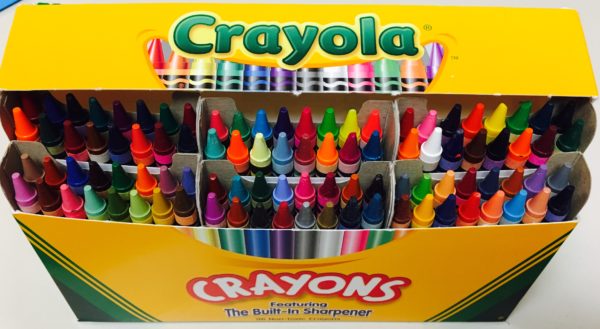
- Exercise equipment and fitness devices — From gyms to treadmills and Pelotons to fitness trackers, they exist because we aspire to be fit and svelte. Gym memberships can be financial clutter; home equipment and trackers might be tangible clutter. We buy them because we aspire to improve our physical health and believe they’ll get us to work out and track our activity. But if we never unbox the trackers or walk on the treadmills and end up using the equipment to hang cute workout clothes we wear (but don’t work out in), it’s aspirational clutter.
- Gardening supplies — Got pots? Seeds? Trowels and knee pads and garden storage? Oh, my! Do you aspire to cultivate a green thumb or make everyone in the neighborhood association green with envy? If you never slice open those seed packets or remove the price tags from the tools, you’ll make your self green around the gills with how much you’ve spent on untouched aspirational clutter.
- Outdoor gear — My sister once had a blind date lean across the table and ask, “Don’t you just love camping?” No, she did not. We do not. But some people would be better off buying stock in REI rather than throwing down money on bikes, boats, hiking gear, camping equipment. Do you aspire to be an outdoorsman or outdoorswoman but never make the time or take the first step to go outside?
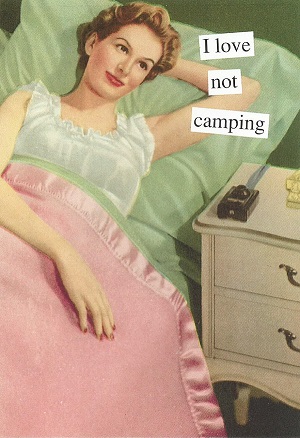
I love this Anne Taintor card, sold by Quiltinia. You can also get magnets at Artworks.
- Clothes that don’t fit your life — I went through a stage where every time I went shopping, I tried on little black dresses, suitable for fancy dinner parties. But I never went to dinner parties. I was craving a wardrobe for an imaginary life to which I aspired. (TV in the 1970s and 1980s set me up for thinking I’d be going to a lot of dinner parties, even Mary Richards’ famously bad ones!)
- Musical instruments — When digging through client’s basements or closets, I find dusty electric keyboards or drum sets, or out of tune pianos. Having the intention of learning an instrument (or revisiting childhood lessons) is understandable, but if you never get an instructor, schedule lessons, or practice, it’s an unfulfilled aspiration.
- Cooking gadgets — I get it. The pandemic made everyone aspire to be a sourdough artiste. But if you’ve got a plethora of bread machines and pasta makers, and drawers bulging with immersion thingies, but you order Door Dash every night, your plan of becoming the next Barefoot Contessa might be a pipe dream.
- Language education tools
- Photography equipment
- Travel Gear
These last three tend to go together. People buy books, recordings, and software courses to learn foreign languages. They purchase luggage and compression cubes, plus all manner of travel guides, to use on those trips where they impress the populace with their fluency in the native language. And oh, the cameras, lenses, and accessories they buy with the intention of learning about f-stops and taking social media influencer-level photos on those trips.
But if they never practice the language, figure out how the photo equipment works, or book the trips, it’s all just layers of aspirations that go unachieved. Shopping provides that dopamine hit that scratches the itch in our novelty- and reward-seeking brains. But when purchases go ignored, the clutter sneers at us.
(Aspirational clutter is a close cousin of nostalgic or identity clutter. If you formerly used something and keep it to maintain a happy connection to the past or how you see yourself, it could be nostalgia- or identity-driven, but if you’ve never used it at all, that’s purely aspirational.)
Inspirational Clutter
If aspirational clutter is “stuff” that supports who you’d be if you’d do something, inspirational clutter is the tangible reflection of ways to motivate you not to do a specific activity, but to live a “better” way. Inspirational clutter is (usually) commercially-created and message-oriented, designed to make you live out certain values:
- Motivational posters and wall art — If it features an inspirational quote or affirmations and reminds you to “Live, Laugh, Love,” but it’s gathering dust in the closet or you’ve stopped even noticing it on the walls, it’s inspirational clutter.
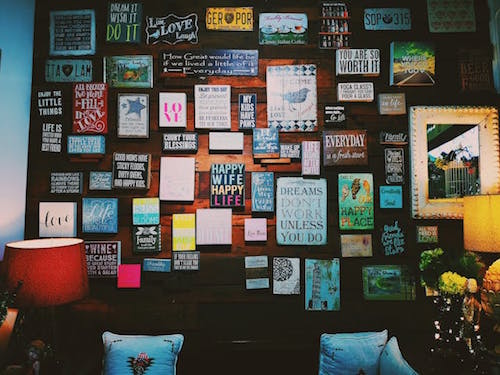
Cluttered Wall of Inspirational Clutter Photo by Mikechie Esparagoza
- Calendars, sticky notes, and affirmation cards – Ditto. All the positive, empowering, and encouraging messages in the world, no matter where you stick them (if you’ll pardon the expression) start to become like wallpaper (or “parsley”) if you don’t notice them.
- Self-help and personal development books — Obviously, as a published author myself, I believe in the power of books that focus on organizing, productivity, self-improvement, personal growth, etc. But buying the latest Brené Brown book and leaving it unread on the bedside table won’t really inspire you. It will mock you.
- Spiritual or religious books and recordings — My clients often own recordings of sermons from their houses of worship (or, quite often, family members’ houses of worship, sent to them with kind intent). The content of the material is inspirational, but there is nothing inspiring about old cassettes, DVDs, or prayer group handouts collecting dust in random corners. Words unread or unheard are meaningless.
- Mindfulness apps — Digital motivational clutter could be its own category. Whether it’s an app for guided meditation, relaxation techniques, or mindfulness exercises, if you’ve never even signed in because it requires setting up yet another password, what does it inspire?
- Blank journals — Wow, people buy (and get gifted) a lot of blank journals. Although I’ve never been able to get the hang of journaling, the research is clear that writing by hand, whether gratitude journals or Julia Cameron’s morning pages, has the positive effect of fostering optimism. But piles of blank notebooks (ignored year after year) foster nothing but dead trees!
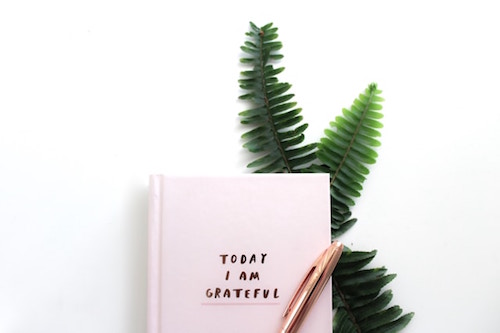
Gratitude Journal Photo by Gabrielle Henderson on Unsplash
- Seminar notes — You can gain tremendous insights at workshops, seminars, and personal development conferences. If going to these events inspires you, keep going! But whether you painstakingly take notes you never look at again or buy the workbooks and lesson plans the speakers and coaches sell, if they are still shrink-wrapped years or decades later, free yourself from the obligation to go through them “someday.”
HOW DO ASPIRATIONAL AND INSPIRATIONAL CLUTTER COMPARE?
There are definite similarities between the two types of clutter.
Perceived Value — Sure, there’s monetary value. You (or someone) spent money on this stuff. But there’s also the value you place on their potential to bring you closer to the life you want to live.
Aspirational clutter (before you recognize it as clutter) holds potential for doing, while inspirational clutter is valued for its anticipated ability to change how you think, feel, and (possibly) act.
Emotional Attachment — Both types of clutter have emotional heft, and decluttering without dealing with the underlying issues can lead to emotional distress.
Aspirational clutter may represent ambitions or dreams that have never been fulfilled, and letting go of the items before reckoning with that can feel like dashing those dreams, leading to a sense of grief. Letting go of inspirational clutter before coming to terms with the diminished (or imaginary) value may evoke a loss of self-worth.
Intentional Acquisition — People generally acquire both types of clutter with good intentions. Whether you buy equipment for a hobby or motivational wall hangings to boost your mindset, the initial intention is positive: a way to enrich your life.
In both cases, the common thread may be the lack of intentionality. Not all gifts are equally desired by the recipient. Ahem.
The differences between aspirational and inspirational clutter come down to the why and the what:
Intended Purpose — Again, aspirational clutter builds up when people intend to pursue hobbies or activities, either out of true desire or hope of becoming “the kind of person who (does X).” Conversely, inspirational clutter comes not from a desire to do something, but to be a better person, either in their own eyes or the eyes of others.
Actual Outcome — Whatever the desired outcome, the two types of clutter tend to yield different effects.
Aspirational clutter often leads of feelings of guilt or frustration over wasted money, lost space, or inconvenience. Inspirational clutter usually has a less deleterious effect; people feel less like they’ve “failed” if they’re still being reminded to “Be the change they wish to see in the world” than if they have spent hundreds or thousands of dollars on hobby materials that fill the closets and cabinets.
Inspirational clutter tends not to yield the same level of guilt or shame as aspirational clutter; it’s also more easily ignored.
REDUCING ASPIRATIONAL AND INSPIRATIONAL CLUTTER
As I previously said in defining aspirational clutter, there comes a point when you’ve got to recognize that you have an excess of items supporting a life you don’t really lead.
There comes a point when you've got to recognize that you have an excess of items supporting a life you don't really lead. Share on X
Approach reducing both types of clutter from logical and emotional perspectives.
Reality Check
For aspirational clutter, get real. Analyze how functional the items really is; is it so old, it’s not useful anymore? Is it way beyond the skill level you’re reasonably likely to achieve?
How feasible is it that you’ll invest time in pursuing the activities you’ve ignored? Questions like, “Have I used this item in the last year (or ever)?” are less productive than asking, “Am I willing to start doing this thing (scheduling lessons, getting out in the garden) this month?” If you’re not going to prioritize time for an activity, send the aspirational clutter packing.
Groove is in the Heart
For aspirational clutter, talk about your emotional attachment to the what’s behind the items; what do they mean beyond their ability to create art or make music or improve the garden? Reflect on the significance of the objects, and whether they still represent what you want to do, or if they are echoes of a former version of yourself.
For inspirational clutter, reflect on whether the items are in alignment with your current goals and values. Do you actually need these items to achieve your true and higher self?
Do the messages on all those wall hangings still genuinely inspire and uplift? Do they actually sometimes make you feel pressured or inadequate? Or are they parsley, unnoticed and unappreciated? Surround yourself with fewer messages, but ones that truly resonate with who you want to to be right now.
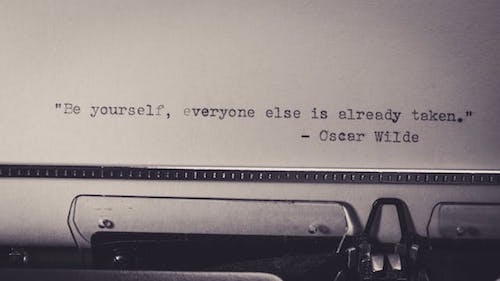
Oscar Wilde Quote Photo by Matej
Think Gratitude, Not Guilt
Even enjoying a sense of freedom, people sometimes feel guilty about letting clutter go on so long. Shift your focus toward being grateful that you’ve developed the ability to recognize your evolving self.
If you like, take Marie Kondo’s advice and express gratitude to (or at least for) things you’re letting go of, knowing they can bring joy to someone who will want, need, and use them.
Once you understand the similarities and differences between aspirational and inspirational clutter, it’s easier to identify your own examples and assess them more critically. Cultivate spaces that authentically support your goals and well-being.
Paper Doll Springs Ahead with Three Empowering Concepts
SPRING HAS (ALMOST) SPRUNG
After a long, dark winter, we’re finally seeing some sure signs of springtime.
For example, we just set the clocks forward an hour. However you feel about Daylight Saving Time (and there are arguments on both sides), it’s likely you enjoyed having more daylight hours in the evening, even if it was just to complain about how tired you were from “losing” that hour the night before.
Depending on where you live, you may have started to see signs of nature’s transitions. Here in Tennessee, the Bradford pear trees started flowering about ten days ago, meaning that about five days ago, a rain and windstorm plastered white petals all over our front doors and our cars.

(Bradford pear trees smell like fish. Some say rotting fish. Allegedly, this scent attracts pollinators; apparently spring is not only the time when a young man’s fancy turns to love, but a young bee’s fancy turns to the delights of rotting fish.)
Spring Cleaning the Stuff
This time of year also brings to mind spring cleaning. First, there’s a tradition of literal spring cleaning. There’s no agreement on how this ritual began, though there are theories that it relates to either cultural-, religious-, or climate-related histories.
Some people place the tradition of spring cleaning at Nowruz, the Persian New Year, which coincides with the first day of spring. Practitioners observe whole-house cleaning called khaneh tekani, or “shaking the house.”
In Judaism, as the days advance toward Passover, homes are rid of “chametz” (anything leavened, usually meaning bread, but more generally any food item that rises or expands, the eating of which is forbidden during the holiday); at the end of the literal cleaning, there’s a ritualistic cleaning with a feather, a spoon, and a candle!
The night before the first seder (a dinner and reading of a book about the exodus from Egypt), observant Jews perform the Bedikat Hametz, one last symbolic check for anything leavened. Instead of using a vacuum, broom, or Swiffer, practitioners shine the light of a candle in corners and crevices, dusting any microscopic crumbs into a spoon.
As Passover and Easter are generally close on the calendar, it’s no surprise that Eastern Orthodox and Catholic families practice cleaning rituals (in the home and at church) at varying points during Lent.
Meanwhile, in Europe and North America, before wall-to-wall carpets and Roombas, early spring bridged the chasm between the cold, windy winters and hot, buggy summers; springtime let people open the windows and doors to fresh air, sweep out the schmutz of lamps lit by whale oil or kerosene and home interiors darkened by coal soot, and generally avoid too much of the yucky aspects of nature coming in. (Oddly, there’s no historical record of people rejecting spring cleaning because of the scent of fishy pear trees!)
Decluttering is closely aligned with cleaning, spring or otherwise. The more you have, the more your space (and your energy) is blocked. Sensibly, then, spring is a common time for people to face the excess around them and set it free. The warmer weather and additional sunshine doesn’t just find us shrugging off our hibernation habits, but combing through closets and drawers to see what can be winnowed away.
Spring Cleaning Our Minds
Spring cleaning (and spring in general) calls to mind letting go of tangible stuff, but also giving ourselves a second chance (the first having been New Year’s Day) to let go of unpleasant, unhealthy, or unfortunate habits. As I wrote about in Organizing A Fresh Start: Catalysts for Success, there are a variety of ways to make fresh starts for ourselves, whether to coincide with new years, new quarters, new months, or holidays.
There’s one other fresh start I like to practice, and that’s tying spring cleaning to my birthday (which falls later this week). Letting go of what isn’t necessary (or useful), whether physical or mental, and clearing out the cobwebs in my mind, as I approach a new year of selfhood, helps me feel better about my next approaching cycle around the sun.
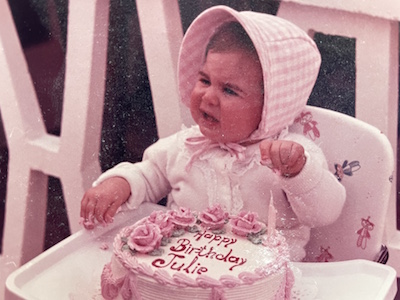
Benjamin Franklin said that “Nothing is certain except death and taxes.” If Ben had been Bettina, she certainly would have written about the certainty of wrinkles (what the cosmetic companies delightfully call “fine lines”) and the unkindness of gravity, but using the days around the onset of spring and my birthday to declutter and refresh my life makes me feel a bit more empowered to fight the onslaught of age-related dilapidation.
To that end, and especially after 2 1/2 months straight of posts about serious topics covering the tangible (master classes on paper management, organizing blended libraries to keep domestic peace) and the scary (unplugging to avoid the physical and mental health dangers of being always-on, avoiding being the victim of a scams), today’s post is designed to declutter the bits and pieces I’ve been saving in my head. They’re scraps and remnants, too good to be discarded unused, but perhaps not large or fancy enough to stand on their own.
MAKE THINGS EARN A PLACE IN YOUR LIFE
Brazilian novelist and lyricist Paul Coelho is most famous for his book The Alchemist.
Celebrate the Global Day of Unplugging
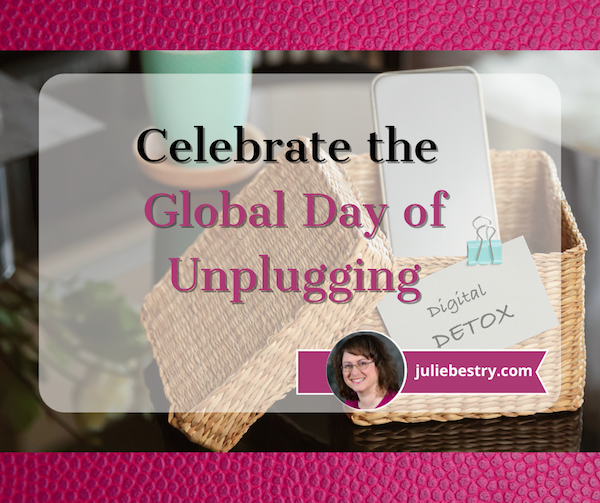
From the moment you open your eyes in the morning until you finally nod off at night, do you experience over-stimulation? Do you suffer from over-availability, whether to your boss, colleagues, or clients, or to everyone who wants to talk to you about their political campaigns or your auto warranty?
Even if you’re overly connected with the world via glass screens, do you feel a lack of connection — with your loved ones, nature, or even your inner self?
Have I’ve got a holiday for you! From sundown this Friday, March 1, 2024 until sundown on Saturday, it is the Global Day of Unplugging!
WHAT IS THE GLOBAL DAY OF UNPLUGGING?
The Global Day of Unplugging is an annual campaign to bring attention to the importance of taking a break from 21st-century technology, whether that’s your computer, your cell phone, or your brand new Apple Vision Pro. The goal is to embrace person-to-person connection, the kind where you can see deeply into someone else’s eyes because you’re in the same space at the same time.

It’s not that digital engagement is bad, per se. Zoom meetings and remote work means we reduce our overall carbon footprint from work-related road trips and airline travel. Cell phones (even if people mostly communicate by text) let us know when our friends are running late or if the kids need someone to pick them up.
But being on-all-the-time keeps us from ever refreshing. When it’s our boss that keeps us connected, that’s toxic, as we’ve discussed previously:
- Toxic Productivity In the Workplace and What Comes Next
- Toxic Productivity Part 2: How to Change Your Mindset
- Toxic Productivity Part 3: Get Off the To-Do List Hamster Wheel
- Toxic Productivity, Part 4: Find the Flip Side of Productivity Hacks
- Toxic Productivity Part 5: Technology and a Hungry Ghost
I mean, we could move to France, as covered in the first post above, or to Australia, which has just voted to allow workers to ignore after-hours phone calls and email from their companies. That could help reduce any employer-related tethering to our devices.
But we do this same damage to ourselves! Like a digital pacifier, we reach for our devices when we’re bored or anxious: in line at the grocery store, waiting for a doctor’s appointment, on the other end of the couch from our kids or significant other.
Technology is pushed on us from above and from all sides, but it has the potential to become an addiction that pushes us further away from our loved ones.
Wouldn’t you benefit from a little escape? For one 24-hour period starting on Friday, people from all four corners of the globe (yes, I know globes have no corners), will intentionally walk away from their digital lives and meet IRL (in real life).
WHY UNPLUG?
Let’s look at the dangers of the attention economy, which treats our eyeballs (attention) as a scarce commodity. We can prevent some of the problems by decluttering our digital spaces; other parts require concerted efforts at unplugging.
Distractions
Our computers and devices bring so much digital clutter to our attention. Some of it involves what other people want us to pay attention to, things we may or may not find important. But other distractions we bring on ourselves by clicking our way into deeper and deeper rabbit holes, directing us to an article online or a video on TikTok, but then we stay, enraptured and forget what we were doing.
These distractions take our focus off where we intend it to be. Intention is how we make sure we handle what we prioritize and not someone else’s priorities. Decluttering minimizes those distractions.
When we’re organized in our homes or offices, the clutter and inefficient systems make it hard to find what we want when we want it. Digital clutter is more insidious because we don’t even realize that we’re being distracted — we’ve become so used to it, and because nobody else sees our digital clutter they don’t call attention to it.
When we eliminate digital excess and distractions and create new, more efficient pathways, we feel calmer and more in control. When that happens, we’re in the zone, better able to do deep work and get into flow, with less wasted time searching for whatever we want — or what our boss or client wants.
However, of all the ways digital addiction hurts us, perhaps the distractions and lack of productivity are the least important.
Physical Health
Digital overuse is bad for our physical health. We develop bad posture from shlumping at our desks, gripping our phones, and hyperextending our necks.
Tech Neck is an informal term for the medical condition we experience when we use our devices. We flex our necks and shoulders, causing strain strain on the muscles and joints; the more we do it, the greater the build-up of tension, leading to muscle pain and headaches. Some research even suggests that overusing mobile devices can cause bone spurs to form at the nexus between the neck and head!
Additionally, exposure to the blue light emitted by phones, tablets, and computer screens can cause insomnia and decrease the quality of our sleep, which can further impact our ability to focus. Of course, when our attention span is decreased (whether due to sleepless nights or being trained to think in tweet-length chunks of language), it takes ever more effort to interpret complex material or be creative.
And, of course, repeated digital interruptions from our devices leads to higher rates of exhaustion and stress-induced ailments.
Stress
Speaking of stress, staying plugged in messes up our psyches in multiple ways:
- Information overload leads to overwhelm — To borrow a movie title, it can seem like we’re dealing with everything everywhere all at once. Your work, your children’s homework portal, national disasters, politics — it’s all so important.
The problem with everything seeming like a priority is that eventually nothing is a priority. All issues, large and small, compete on a stage the size of the planet, the form of your smartphone, and the synapses in your brain simultaneously.
The problem with everything seeming like a priority is that eventually nothing is a priority. All issues, large and small, compete on a stage the size of the planet, the form of your smartphone, and the synapses in your brain… Share on X
- Overwhelm leads to increased anxiety — Think about the last time you were trying to juggle multiple problems at the same time. I bet you were trying to give your attention to so many interested parties that one last, small request (“Honey, where’s the Costco card?” “Mom, can you take me to the mall?”) made you feel like your limbs where going to fly off in different directions.
- Use of social media leads to a variety of emotional dysfunctions. Over the last decade, social media use has grown; in 2022, the average person spent 2 hours and 27 minutes on social media per day. Why is that worrying?
- The more we connect online, the more we experience FOMO (fear of missing out).
- We more see other people having fun (attending parties, going on vacation, celebrating life milestones), the more likely we are to feel lonely.
- Comparing one’s own life to other’s highlight reels can lead to lower levels of self-esteem. If you judge your own self-worth by comparing yourself to others, social media may make you feel like you’re failing.
- As people — particularly younger folks — spend less time developing in-person social interactions and more time on social media and dating apps, there’s an increase in social awkwardness when they finally do meet face-to-face. This contributes to more social anxiety. Additionally, the social relationships we do have tend to fray without positive, in-person interactions.
- Social media makes it easier for people to exhibit bad behavior. Bullied teenagers used to have a respite from their cruel classmates once the school day was over; now, it follows them home on their phones and social gaming sites. And we all know about rude online treatment of anyone who dares to have a differing opinion on anything, whether politics, sports, or music, or has a different religious, national, ethnic, or other kind of identity.
- More nuanced unkindness online occurs in the withholding of likes or social approval, which again, when we compare our “performance” and “appeal” to that of others, can make us feel like we’re lacking.
- All of this can lead to depression.
- We can lose the ability to ability to self-soothe when we’re constantly tethered to our digital pacifiers. On the plus side, our devices can distract us from very real things that, well, suck. But when we become dependent on that kind of distraction, our former life skills dissolve. We used to be able to make polite conversation with strangers in line or read books for extended periods of time. We could go to sleep without an hour of scrolling. Now, we’re often unable to tame our thoughts unless we allow the internet to do it.
WHY IS IT SO HARD TO UNPLUG?
Every app and the whole on the internet is purposely designed to keep you coming back.
There’s a scientific explanation. Every time we use our devices, it reinforces the pathways taken by dopamine, a happy-making neurotransmitter at the base of our reward-seeking behaviors. Just like the bells and blinking lights on a Vegas slot machine condition us to pull the lever or push the buttons one more time, the notifications, “Breaking News” headlines, daily streaks in apps, and aforementioned “likes” draw us back in.
Worse, as with other addictions, when this neurotransmitter pathway doesn’t get reinforced, we actually experience something very similar to a chemical withdrawal. Have you ever found yourself without your phone, feeling jittery and unable to tame your mood?
It’s not your fault. You have to use modern devices for work, and you really do want to have access for many of life’s convenience. But you will feel better if you can lessen your dependence.
HOW TO UNPLUG FOR A DAY
To celebrate the Global Day of Unplugging, you can look for a community event near you. There’s everything from a musical chairs event in Charleston to Yoga and Sound Healing in Gainesville, from a Family Bonfire & S’Mores in Star, Idaho to something called a Disco Get Down-Dog in San Diego. And this truly is global, with events from Denmark to Bolivia, Virginia to Switzerland!
The Global Day of Unplugging organization has listed over 200 ideas of what you can do instead of being plugged in!
The idea isn’t to become a Luddite, but to find ways to feel less isolated or disconnected (whether from others or yourself). Ideas range from the tame (unclutter your pantry, take a hike, do some gardening) to those that indulge your inner child (build a living room fort, blow bubbles, put on a puppet show).
Create art (decorate a lantern, have fun with origami) or go on a quest (create a scavenger hunt or go on a Gnome hunt)! And while I’d be hopeless at crocheting for a cause or going on an ice-block slip & slide, all of these events would definitely be healthier for my brain, heart, and soul than scrolling through the curated slime-fest some platforms have become.
You can also support the global unplugging movement by making a donation or purchasing “merch,” but even joining at the free plan lets you download their “I/We Unplug” signs.
If you enjoy the Global Day of Unplugging, consider taking a tech sabbath as described by Tiffany Shlain in 24/6: Giving up Screens One Day a Week to Get More Time, Creativity, and Connection or doing a digital detox on a more regular basis, so you and your devices take a real break from one another.
Blending Libraries: How To Organize Books with Your Sweetheart

Did you know that in addition to February 14th being Valentine’s Day, it’s also International Book Giving Day and Library Lovers’ Day? As someone who’d much rather receive a bouquet of books than flowers, this makes sense to Paper Doll. And February 20th is Clean Out Your Bookcase Day!
The literary and the romantic will always be tied together. I mean, watching or hearing someone declare their love is nice, but being able to read (and reread) the declaration more than two hundred years later? Jane Austen knew what she was doing when she had Persuasion‘s Captain Wentworth’s write this to Anne Elliot.
I can listen no longer in silence. I must speak to you by such means as are within my reach. You pierce my soul. I am half agony, half hope. Tell me not that I am too late, that such precious feelings are gone for ever. I offer myself to you again with a heart even more your own than when you almost broke it, eight years and a half ago. Dare not say that man forgets sooner than woman, that his love has an earlier death. I have loved none but you. Unjust I may have been, weak and resentful I have been, but never inconstant…
The Ugly Truth
The sad truth is that not all relationships last. The Gotye song Somebody I Used to Know is heartbreaking and universal, especially when he says,
No, you didn’t have to stoop so low
Have your friends collect your records and then change your number

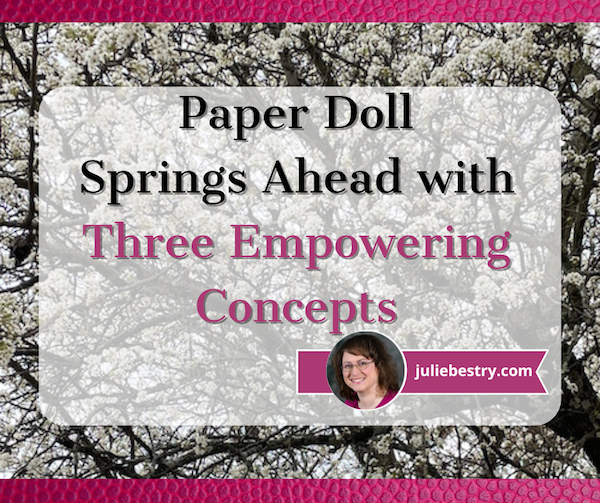

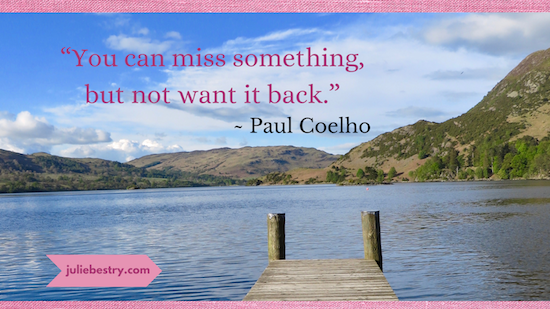


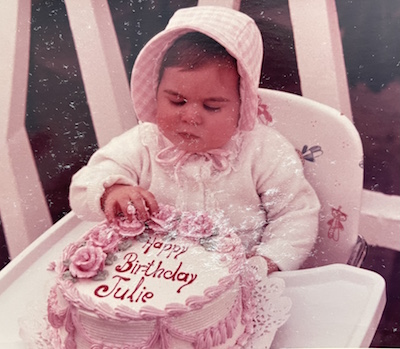

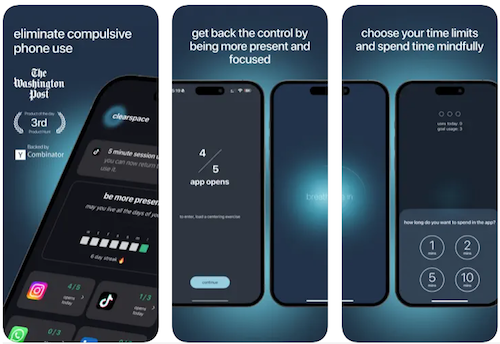
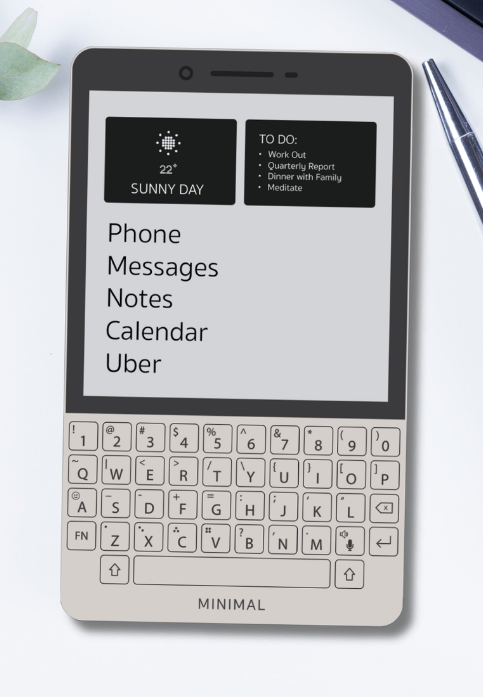



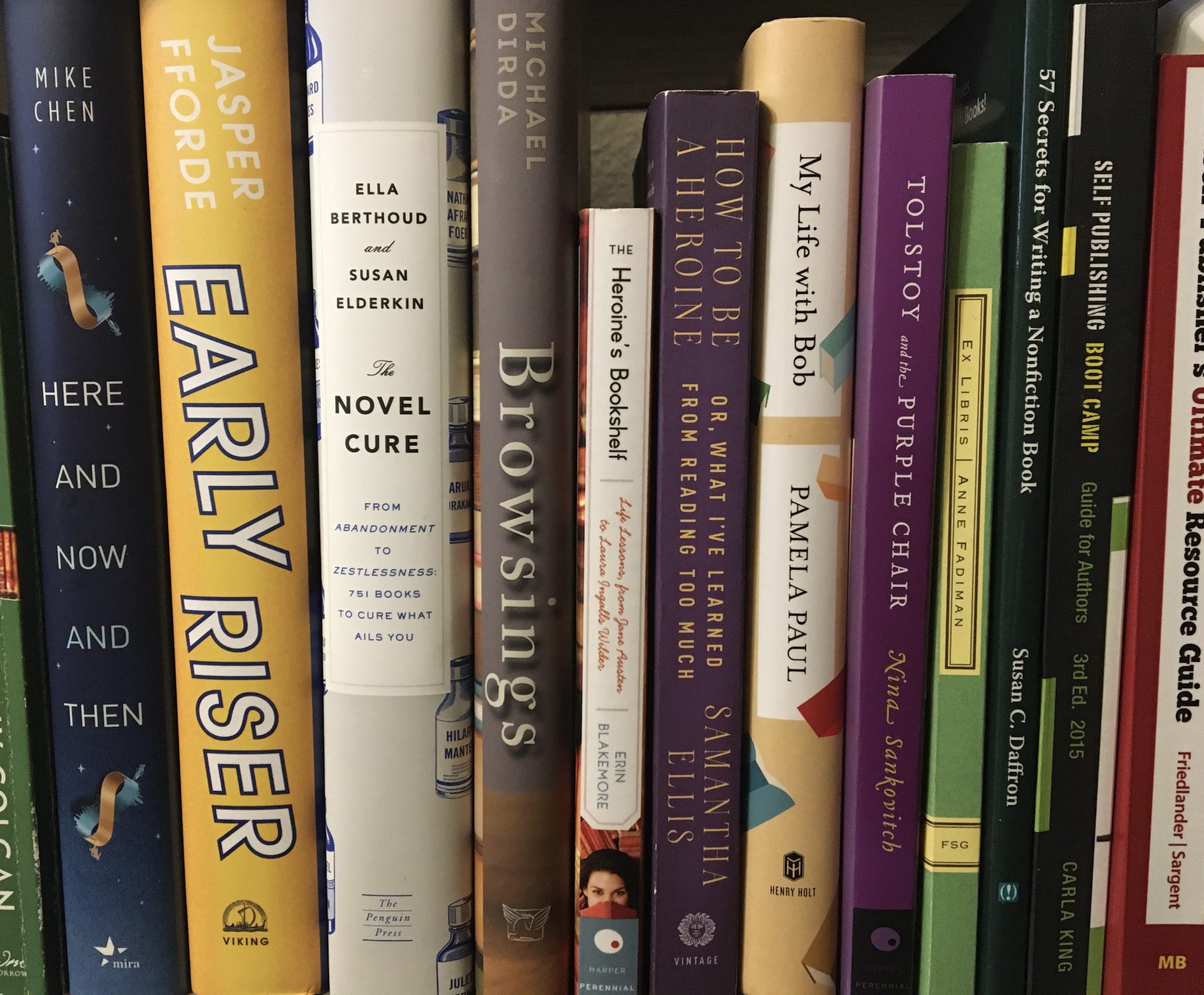
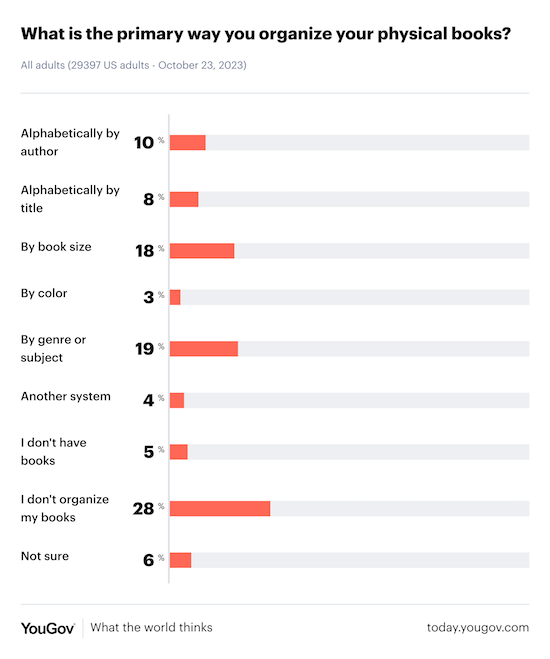

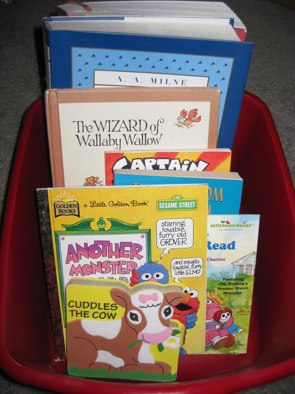




Follow Me